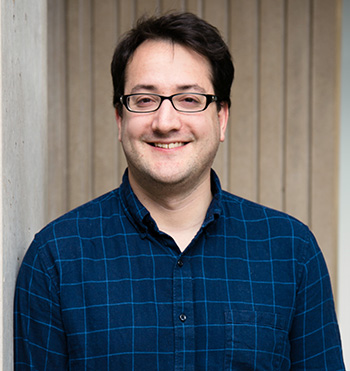The Alfred P. Sloan Foundation has awarded Sloan Research Fellowships to two UC Santa Cruz scientists: Andrew Skemer, assistant professor of astronomy and astrophysics, and Kristy Kroeker, assistant professor of ecology and evolutionary biology.
Awarded annually since 1955, the Sloan Research Fellowships are given to early-career scientists and scholars whose achievements and potential identify them as rising stars, the next generation of scientific leaders. Fellows receive $55,000 to further their research.
Skemer specializes in direct imaging of extrasolar planets, developing new astronomical instruments and observational techniques to improve the ability of astronomers to see and study very faint planets near their bright host stars. As a Hubble Fellow at the University of Arizona, he built an innovative spectrograph (Arizona Lenslets for Exoplanet Survey, or ALES) for the Large Binocular Telescope, and he is now using it to obtain spectra of all currently known directly imaged exoplanets. A spectrograph spreads out the light from an object into a spectrum of different wavelengths, which can yield clues to the physical properties of a planet.
"My goal is not just to find exoplanets but to characterize them," Skemer said. "I want to start understanding exoplanets in the same way we understand the planets in our own solar system."
Kroeker's research focuses on the effects of environmental change in dynamic and complex coastal ecosystems. Carbon dioxide emissions are driving unprecedented environmental changes, including climate change and ocean acidification. Kroeker has done notable work on the ecological effects of ocean acidification, and she notes that most ecosystems face a whole range of stressors, from warming to overfishing. She plans to conduct large-scale studies of seagrass and kelp forest ecosystems, looking at multiple environmental drivers and their effects on species interactions and ecosystem function.
"My research suggests non-linear interactions among multiple stressors are very common, and these interactions could cause ecological surprises in the vulnerability of marine species and communities to environmental change," Kroeker said. "I want to improve our ability to forecast and manage the emergent effects of environmental change in nearshore ecosystems."
The Sloan Research Fellowships are awarded in close coordination with the scientific community. Candidates must be nominated by their fellow scientists, and winners are selected by an independent panel of senior scholars. The fellowships are awarded in chemistry, computer science, economics, mathematics, computational and evolutionary molecular biology, neuroscience, ocean sciences, and physics.
The Alfred P. Sloan Foundation is a philanthropic, not-for-profit grant making institution that supports original research and education in science, technology, engineering, mathematics, and economics.




